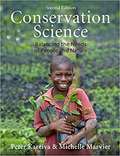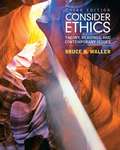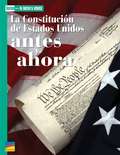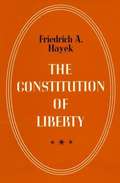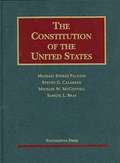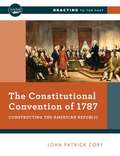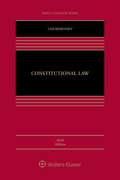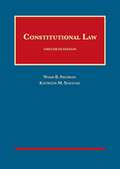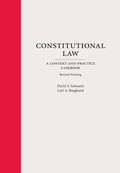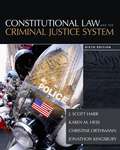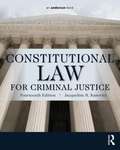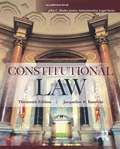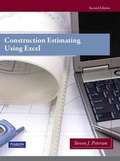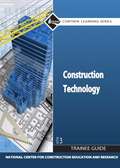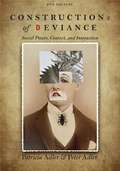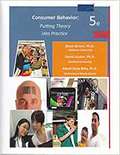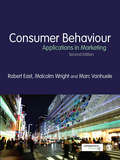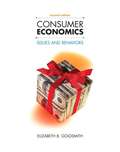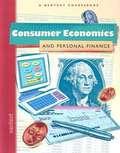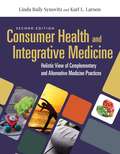- Table View
- List View
Conservation Science: Balancing the Needs of People and Nature
by Michelle Marvier Peter KareivaNow is the time for conservation science―a mission-oriented scientific enterprise that seeks to protect nature, including Earth’s animals, plants, and ecosystems, in the face of unprecedented human demands upon the planet. Conservation scientists apply principles from ecology, population genetics, economics, political science, and other natural and social sciences to manage and preserve nature. The focus of this textbook is first and foremost on protecting nature and especially Earth’s biota. It also contains a heavy emphasis on highlighting strategies to better connect the practice of conservation with the needs and priorities of a growing human population. <p><p> Now used at over 150 colleges and universities, Conservation Science is an original and modern approach to conservation. Gretchen Daily (Stanford University) says it well: “Based on unparalleled, firsthand experience, Kareiva and Marvier explore the innovative approaches to conservation being honed around the world today. Their account is rigorous and engaging, with fresh questions, data, and quantitative analysis interwoven with vivid stories of actual conservation practice in the field." <p><p> Conservation Science was primarily written primarily for undergraduates and beginning graduate students who are interested either in academic careers or working in conservation at government agencies, non-governmental organizations, or international institutions.
Consider Ethics: Theory, Readings, and Contemporary Issues
by Bruce N. WallerOffering a balance of theory and applications and a mix of text and readings, Consider Ethics begins with chapters covering ethical theory, each of which is followed by related, classical readings. The book concludes with an examination of six contemporary ethical issues presented in a pro/con format with introductory material that places each issue in context. Featuring selections from the world's most influential philosophers, this combination of primary texts and explanatory pedagogy presents the material in a clear, accessible way that does not sacrifice rigor. Making connections among different ethical theories throughout, the text helps students to engage the subject matter and apply theories to important contemporary ethical issues.
La Constitución de Estados Unidos antes y ahora: Textos Para La Lectura Atenta (Texts Close Reading )
by Benchmark Education Co. Llc StaffNIMAC-sourced textbook
The Constitution of Liberty
by Friedrich A. HayekIn this classic work Hayek restates the ideals of freedom that he believes have guided, and must continue to guide, the growth of Western civilization. Hayek's book, first published in 1960, urges us to clarify our beliefs in today's struggle of political ideologies.
The Constitution of the United States: Text, Structure, History, and Precedent
by Michael Stokes Paulsen Steven G. Calabresi Michael W. Mcconnell Samuel L. BrayThis large casebook on constitutional law provides a comprehensive examination of the United States Constitution including discussions of modern Supreme Court precedent and current case law but focusing strongly on the original text, legislative handling of constitutional law issues and the first one hundred and fifty years of precedent cases. The work is divided into two sections covering the structure and powers of the national government and rights against the government and chapters cover each article and amendment to the constitution outlining each piece of important case law and providing study and discussion questions. Paulsen is professor of law at the University of St. Thomas, Calabresi at Northwestern University, McConnell at Stanford University and Bray is the executive director of the Stanford Constitutional Law Center. Annotation ©2011 Book News, Inc. , Portland, OR (booknews. com)
The Constitutional Convention of 1787: Constructing the American Republic (Reacting to the Past Series)
by John Patrick CobyA Norton original in the Reacting to the Past series, The Constitutional Convention of 1787: Constructing the American Republic brings to life the debates that most profoundly shaped American government. As representatives to the Convention, students must investigate the ideological arguments behind possible structures for a new government and create a new constitution. <p><p> Reacting to the Past is an award-winning series of immersive role-playing games that actively engage students in their own learning. Students assume the roles of historical characters and practice critical thinking, primary source analysis, and argument, both written and spoken. Reacting games are flexible enough to be used across the curriculum, from first-year general education classes and discussion sections of lecture classes to capstone experiences and honors programs.
Constitutional Law (Aspen Casebook)
by Erwin ChemerinskyBuy a new version of this Connected Casebook and receive access to the online e-book, practice questions from your favorite study aids, and an outline tool on CasebookConnect, the all in one learning solution for law school students. CasebookConnect offers you what you need most to be successful in your law school classes— portability, meaningful feedback, and greater efficiency. A leading text by a prominent scholar, Constitutional Law is known for its concise, yet comprehensive presentation. Professor Chemerinsky’s distinctive approach for the Sixth Edition presents the law solely through case excerpts and his own essays. With the author’s context and background information, the law becomes more readily understood. A flexible organization accommodates a variety of course structures; no chapter assumes that students have read preceding material. New to the Sixth Edition: New cases decided since the Fifth Edition, including those on partisan gerrymandering, the travel ban, state action, freedom of speech, and the religion clauses Significant reorganizations of some of the chapters (including chapters on federal limits on state power and the religion clauses) Professors and students will benefit from: Renowned authorship Concise, yet comprehensive presentation Distinctive approach presents the law solely through case excerpts and author-written essays Straightforward, accessible writing style that provides context and background information for greater understanding Flexible organization—no chapter assumes that students have read the rest Cases and materials have been edited to be as ideologically neutral as possible Teaching materials include: Teacher’s Manual
Constitutional Law: Leading Cases, 2009 Edition
by Jesse H. Choper Richard H. Fallon Yale Kamisar Steve H. ShiffrinA 1600-page constitutional law casebook has turned out a compact casebook of less than 900 pages in this book, very much useful for a basic course in constitutional law. By judicious editing of the most important decisions of the Supreme Court and careful summarizing of less significant cases, this book contains "the essentials" for a single course on the subject.
Constitutional Law (University Casebook Series)
by Noah Feldman Kathleen SullivanThis casebook provides a unique combination of clearly structured and lawyerly coverage of the cases with rich historical, theoretical, and philosophical materials that illuminate the development of our constitutional law. The note materials and questions in the casebook make it easy to structure classes and promote lively discussion. And comparative examples from the constitutional law of other nations are provided throughout. <p><p> The Twentieth Edition is an updated version of this classic casebook, adding new materials on the Supreme Court’s most recent decisions on the First Amendment, Equal Protection, Substantive Due Process, Separation of Powers, and Federalism.
Constitutional Law: A Context and Practice Casebook
by David S. Schwartz Lori A. RinghandThis innovative casebook takes constitutional law beyond the realm of academic theory and enables students to approach the topic as practicing attorneys as well as legal thinkers. The classic cases are presented, but instructors also are given the opportunity to use practice problems, in-depth case studies, and non-case materials to explore the richness of constitutional decision making as it actually occurs in today's world. An array of "the constitution outside the courts" materials are provided, such as opinions from the Office of Legal Counsel, Congressional debates about judicial selection, and political science scholarship about judicial decision making. A full teacher's manual with electronic teaching notes is included, as are suggested syllabi for teaching the material as either a single comprehensive course or in a two-course package separating federalism and structural issues from civil rights and liberties. This book is part of the Context and Practice Series, edited by Michael Hunter Schwartz, Professor of Law & Associate Dean for Faculty and Academic Development, Washburn University School of Law.
Constitutional Law And The Criminal Justice System
by J. Scott Harr Jonathan Kingsbury Christine H. Orthmann Kären M. HessMarket-leading CONSTITUTIONAL LAW AND THE CRIMINAL JUSTICE SYSTEM, 6th Edition, uses real-world illustrations, succinct case summaries, and proven learning tools to equip readers with a solid understanding of our often-complex Constitution and criminal justice system. Avoiding confusing "legalese", the book features more than 200 plainly written, summarized cases that introduce readers to the most influential and relevant cases. It also thoroughly covers the Fourth and Fifth Amendments, exploring their application to issues relevant to criminal justice: reasonable search and seizure, double jeopardy, and testifying against oneself. The sixth edition includes expanded discussions of the First and Second Amendments as well as cutting-edge coverage of such high-profile topics as immigration, terrorism/homeland security, death row, and many others.
Constitutional Law Cases in Context
by Randy E Barnett Josh BlackmanConstitutional Law: Cases in Contextplaces primary emphasis on how constitutional law has developed since the Founding, its key foundational principles, and recurring debates. By providing both cases and context, it conveys the competing narratives that all lawyers ought to know and all constitutional practitioners need to know. Teachable, manageable, class-sized chunks of material are suited to one-semester courses or reduced credit configurations. Generous case excerpts make the text flexible for most courses. Cases are judiciously supplemented with background readings from various sources. Innovative study guide questions presented before each case help students focus on the salient issues, challenging them to consider the court’s opinions from various perspectives, and suggesting comparisons or connections with other cases.
Constitutional Law for Criminal Justice (14th Edition)
by Jacqueline R. KanovitzCriminal justice professionals often do not receive the training they need to recognize the constitutional principles that apply to their daily work. Constitutional Law for Criminal Justice offers a way to solve this problem by providing a comprehensive, well-organized, and up-to-date analysis of constitutional issues that affect criminal justice professionals. Chapter 1 summarizes the organization and content of the Constitution, the Bill of Rights, and the Fourteenth Amendment. The next eight chapters cover the constitutional principles that regulate investigatory detentions, traffic stops, arrests, use of force, search and seizure, technologically assisted surveillance, the Wiretap Act, interrogations and confessions, self-incrimination, witness identification procedures, the right to counsel, procedural safeguards during criminal trials,#65533;First Amendment issues relevant to law enforcement, capital punishment, and much more. The final chapter covers the constitutional rights of criminal justice professionals in the workplace, their protection under Title VII of the Civil Rights Act, and their accountability under 42 U. S. C. #65533; 1983 for violating the constitutional rights of others. Part II contains abstracts of key judicial decisions exemplifying how the doctrines covered in earlier chapters are being applied by the courts. The combination of text and cases creates flexibility in structuring class time. Constitutional Law for Criminal Justice makes complex concepts accessible to students in all levels of criminal justice education. The chapters begin with an outline and end with a summary. Key Terms and Concepts are defined in the Glossary. Tables, figures, and charts are used to synthesize and simplify information. The result is an incomparably clear, student-friendly textbook that has remained a leader in criminal justice education for more than 45 years.
Constitutional Law (John C. Klotter Justince Administration Legal Series)
by Jacqueline R. KanovitzPresents an up-to-date analysis of critical constitutional issues. Special attention is given to issues of greatest concern to criminal justice personnel - detention, arrest, search and seizure, interrogations and confessions, self-incrimination, due process, and right to counsel. Also includes constitutional aspects of criminal and civil liabilities of justice personnel, and constitutional and civil rights in the workplace.
Constitutional of Nepal 2015
by Secretariate of Constitutional Assembly of Nepalनेपालको संविधान २०७२ संविधानसभा सचिवालय सिंहदरबार, काठमाडौं । यो पहुँचयुक्त ई-पुस्तक दृष्टिविहिन तथा छापा अक्षर पढ्न बाधा भएका अपाङ्गता भएका व्यक्तीहरूको निशुल्क उपलब्धताको लागी एड्राड्-नेपालले तयार गरेको हो ।
Construction Estimating Using Excel Second Edition
by Steven J. PetersonConstruction Estimating with Excel, Second Edition, introduces readers to the fundamental principles of estimating. Using drawing sets, real-world exercises, and examples, the text offers students critical estimating experience. The book moves step-by-step through the estimating process, discussing the art of estimating, the quantity takeoff, how to put costs to the estimate, and how to finalize the bid. As students progress through the text they are shown how Microsoft Excel can be used to improve the estimating process. Because it introduces spreadsheets as a way of increasing estimating productivity and accuracy, the book can help both beginning and experienced estimators improve their skills.
Construction Technology: Trainee Guide (Third Edition)
by NccerThis curriculum is ideal for programs formatted as Construction Cluster or Building Trades. It consists of modules compiled from five existing NCCER programs. • 425 Hours (Includes 72.5 hours of Core Curriculum, which is a prerequisite for completion and must be purch This exceptionally produced trainee guide features a highly illustrated design, technical hints and tips from industry experts, review questions and a whole lot more!
Construction Technology: Trainee Guide (Third Edition)
by NccerThis curriculum is ideal for programs formatted as Construction Cluster or Building Trades. It consists of modules compiled from five existing NCCER programs. • 425 Hours (Includes 72.5 hours of Core Curriculum, which is a prerequisite for completion and must be purch This exceptionally produced trainee guide features a highly illustrated design, technical hints and tips from industry experts, review questions and a whole lot more!
Constructions of Deviance: Social Power, Context, and Interaction 8th Edition
by Patricia A. Adler Peter AdlerPacked with the most recent and relevant articles in the field, CONSTRUCTIONS OF DEVIANCE: SOCIAL POWER, CONTEXT, AND INTERACTION, Eighth Edition, shows readers how to apply the concepts and theories of deviance to the world around them. The book's current, comprehensive coverage includes both theoretical analyses and ethnographic illustrations of how deviance is socially constructed, organized, and managed. Seasoned authors and award-winning professors, Patricia Adler and Peter Adler cover a wide variety of deviant acts-challenging readers to see the diversity and pervasiveness of deviance in society. They present deviance as a component of society, examine the construction of deviance, and explore the processes in society that create deviance. Intriguing selected studies focus on the experiences of deviants, the deviant-making process, and the ways in which people labeled as deviant in society react to that label. The balanced selection of readings is timely and engaging, while in-depth introductions, explanations of theory, and discussion questions guide readers through the fascinating material.
Consumer Behaviour
by Malcolm Wright Marc Vanhuele Robert EastWhat's the best day to advertise groceries? Does a lookalike damage the brand it mimics? Do your long-term customers recommend you more than others? How damaging is negative word of mouth? Should retailers use 9-ending prices? These are some of the fascinating questions you will explore in this text.<P> The text is written by respected marketing academics across the globe with a strong focus on the use of research to help higher-level students develop analytical and evidence-based thinking in marketing. It extends beyond a psychological approach to provide an empirical understanding of the subject for success in industry roles or further research in the field, and takes into consideration not just the individual but the market environment.<P> New to this second edition:<P> - Fully updated with contemporary, global examples and case studies to encourage an international readership<P> - Further coverage of cross-cultural comparison, including a new chapter on Consumer Differences which also incorporates age and gender differences<P> - Study features such as exercises, questions/answers, and a fully updated companion website with lecturer and student resources - www.sagepub.co.uk/east2e <P> This textbook is essential reading for postgraduate students (MA, MSc, MBA) taking courses in consumer behaviour and undergraduate students specialising in consumer behaviour.<P>
Consumer Economics: Issues and Behaviors (Second Edition)
by Elizabeth B. GoldsmithThis book provides an understanding of how the marketplace works, what our role is in it, and how our choices affect our lifestyles.
Consumer Economics and Personal Finance
by John Burton Sharon Franklin Barbara Littman Robert Mayer Mary Herd Tull Diane WildeThe first step in taking charge of your financial life is to figure out who you are.What are your talents and skills? What are you interested in? What are your values? What type of personality do you have? How do you learn best? Setting goals for yourself, both short-term and long-term goals, will help you decide what's important in life.You will be more likely to achieve your goals if they are: your own goals, realistic, stated in a positive way, reachable in a specific period of time, and shared with someone you trust.
Consumer Health and Integrative Medicine: Holistic View of Complementary and Alternative Medicine Practices
by Linda Baily Synovitz Karl L. LarsonToday, being a health consumer encompasses more than being knowledgeable about traditional medicine and health practice but also includes the necessity to be well informed about the expanding field of complementary and alternative medicine. This book was written to expand upon the many alternative modalities that many other consumer health texts overlook. It includes chapters on the major alternative medicine systems and healing modalities, including Ayurvedic medicine, traditional Chinese medicine, naturopathy, homeopathic medicine, chiropractic medicine, massage, reflexology, and herbals or botanicals. <p><p> The authors mission is to increase reader's knowledge base, not make up their mind, as we all make better choices related to our own personal health care practices when we are informed consumers.
